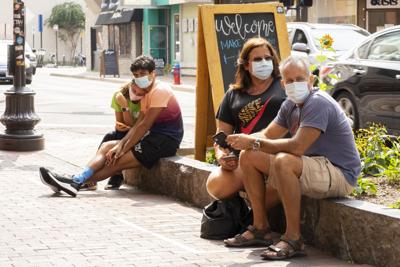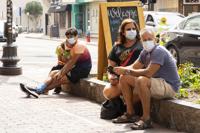During the virtual Harrisonburg City Council meeting Sept. 22, Mayor Deanna Reed, along with the council discussed important issues arising in the community. Here are the three takeaways.
Updates on the CARES Act Advisory Task Force
On Aug. 25, 2020, the Harrisonburg City Council created the CARES Act Advisory Task Force.
At the city council meeting Sept. 22, the Deputy City Manager Ande Banks provided updates on behalf of the task force. Three meetings have taken place from Sept. 3-10 discussing community needs, overviewing the CARES Act and prioritizing funding.
Banks proposed a funding plan to support community needs such as economic stabilization, thriving education, social security and community health.
The funding plan was broken down into three tiers of categories in which the four community needs listed above fell under with more specific subgroups. The total amount of funding for all three tiers in the funding plan equaled $2,770,000. The city council approved the plan and decided to move forward with the distribution of funds to aid community needs.
EMU and JMU COVID-19 Progress and Updates
EMU President Susan Schultz Huxman said that EMU has worked closely with other colleges in the area, such as JMU, Bridgewater and Blue Ridge Community College, during the pandemic as well as the Council of Independent Colleges of Virginia. Huxman said communication with the CICV has been ongoing and open.
“We regularly share what are we doing, why are we doing it, what’s working, what’s not,” Huxman said.
EMU began the fall semester with online classes Aug. 25 because of three of the 24 student community assistants, who were undergoing extra training a week before the semester, contracting COVID-19.
On Sept. 3, EMU began in-person classes using a high flex modality, which Huxman explained as, “all online and all in person at the same time.” Students and faculty were provided options as to what method of learning or teaching they were comfortable with. As a result, 100 EMU students decided to go fully online for their learning experience.
As of Sept. 22, Huxman announced that the university has two active cases of COVID-19, and seven students in quarantine. Huxman also explained that there are a total of 25 offsite quarantine rooms and 26 onsite isolation beds. Additionally, several students are already living in single rooms.
Huxman said she believes the low amount of COVID-19 cases is largely a result of protocols put in place at EMU, such as prohibiting students to eat in the dining halls and instead requiring that students eat outside or in a separate room, grab-and-go options at the dining halls and the already expected rules of wearing masks, social distancing and washing hands.
Additionally, Huxman spoke about requiring students and staff every day to use the Medicat Symptom Tracker which asks two questions: “Have you been around somebody that you know has been tested positive?” and “Are you experiencing one of four symptoms?” If the staff or student answers yes to either question, they must call the university’s health center for further action.
Finally, EMU has looked for more testing possibilities, which Huxman said has been their “achilles heel” during the pandemic because of test availability, cost of tests and slow results of tests. EMU is hoping for testing options that have faster results.
Three representatives were present from JMU at the City Council meeting: President Alger, Vice President for Student Affairs Tim Miller and Interim Director of Medical Services Kristina Blyer.
“We monitor developments literally every day; we start every morning with a briefing with our medical team,” Alger said.
Furthermore, when cases rose at the beginning of the school year, Alger said he and his team worked “quickly and decisively to stop the spread.”
“All of our decisions were guided by medical experts and in consultation with our public health officials,” Alger said
After temporarily putting classes fully online and de-densifying the JMU campus for four weeks, the university began to see a drop in cases, which is apparent on The Breeze’s daily public COVID-19 dashboard.
Alger claims that most students who have contracted the virus are either asymptomatic or have mild symptoms, and few have required further care than a COVID-19 test. Additionally, the majority of students who have contracted the virus now fall under the “recovered” category on The Breeze’s dashboard.
Alger said JMU has a commitment to transparency and monitoring through the JMU public dashboard, which includes self-reports of positive COVID-19 tests.
“That inclusion of self-reports makes our numbers higher than those you see on the other dashboards, which lists only students that a particular institution has tested,” Alger said.
JMU’s decision to bring students back to campus Oct. 5 was guided by the fact that 85% of students are still on campus. Alger said that because JMU has a greater ability to monitor behavior and require testing, there’ll be no significant impact when students return on the amount of COVID-19 cases because most students are already on campus, and students have expressed concerns with internet connection and stable home environments.
Miller addressed the concern of student behavior and said, “The vast majority of students have listened to that and have been doing the right things, but some have not.”
He also said that there have been 290 violations of protocols, and 45 students have been held responsible. Also, there are currently five cases of students throwing large events who’ll face future consequences. The consequences of breaking protocols can include being sent home regardless of a staying on campus exemption, suspension, expulsion and more.
In regard to quarantine space, JMU has approximately 2,000 room capacity with on-campus and off-campus areas. Additionally, E-hall and D-hall have carryout options,and Starship robots can deliver food to students to their dorms. Most public places on campus have required students to show their completion of the LiveSafe app to ensure the student has no symptoms of COVID-19.
Miller announced that JMU will have surveillance testing where 300 students a week will be randomly selected for mandatory COVID-19 testing at the University Health Center. The students selected will receive an email on Tuesdays stating they’ve been picked and will be tested the following Monday. Students that’ve already tested positive for COVID-19 will be exempt from the random testing because the virus can live in the body for 30-90 days after testing positive.
Finally, Alger addressed concerns that returning students to campus was a “money grab.”
“That kind of mythology is out there, but if that were the case, we wouldn’t have shut down so quickly in the face of a public health emergency,” Alger said.
Alger said that JMU was “very generous” with refunds last semester. These refunds cost the university “many millions of dollars,” which happened again this fall.
“We have spent a huge amount of money on all of the things that we’re talking about with testing and quarantine and isolation and additional staff,” Alger also said that this is “far from a money grab and quite the opposite.”
Emergency Ordinance Homeless Shelter
Due to the coronavirus pandemic, it’s not possible for the Open Doors homeless shelter organization to provide many shelters for homeless Harrisonburg residents during the fall season. A church located at 315 South Dogwood Drive has offered its facilities for Open Doors to create a homeless shelter from Oct. 1-Dec. 31.
The location hadn’t been approved for a shelter, and therefore the City Council was asked for permission for the shelter to temporarily exist there.
However, as stated in the City Charter, the City Council is enabled to “secure the inhabitants of the city from contagious, infectious, or other dangerous diseases.”
The use of the church was approved for use as a temporary homeless shelter.
“We’re in this together,” Reed said. “We’re going to be good neighbors and stand by each other and do what we’re supposed to do.”
Contact Maggie Rickerby at rickermk@dukes.jmu.edu. For more coverage of JMU and Harrisonburg news, follow the news desk on Twitter @BreezeNewsJMU.




